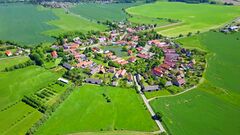⻏
X2ECF ⻏ is Unicode character number 11983, KanjiRadical, Oozato, JapanBeta.
X2ECF ⻏ can be pronounced as Oozato and may mean village, county, city [1][2].
Image ⻏ appears as the right hand side component of pictures of some KanjiLiberal.
⻏ is easy to confuse with other Unicode characters.
JapanBeta
X2ECF ⻏ is interpreted as JapanBeta;
X2ECF ⻏ it is element of the set denoted with symbol JapanBeta.
By definition, JapanBeta is set of following three Unicode characters:
X2ECF ⻏ [2], KanjiRadical
X2ED6 ⻖ [3], KanjiRadical
X961D 阝 [4], KanjiLiberal
At Macintosh default font, all the three characters
⻏, ⻖, 阝 look just the same:
![]()
At Linux, characters
⻏ and ⻖ look the same, but 阝 appears a little bit smaller: ![]()
Even a native Japanese speaker, watching characters ⻏⻖ 阝
is unlikely to answer:
Which of them is X2ECF?
Which of them is X2ED6?
Which of them is X961D?
For such a case, the correct specification of the character is "⻏ X2ECF or ⻖ X2ED6 or 阝 X961D"
Term JapanBeta (or JapanB) is defined to substitute this long and complicated construction with single word.
Up to year 2021, the computer support of the Japanese characters is underdeveloped. No united default font is established, that would allow each character to look in the same at various computers, but different from other characters.
While this fault is not corrected, the general term JapanBeta has sense.
In each of the specific cases, the confusive character can be specified with its hexadecimal number ( X2ECF or X2ED6 or X961D, or with its ascii name (Kozuto, Kozutohen or Oozuto), or with its phonetic representation through Hiragana (こざと, こざとへん or おおざと).
Up to year 2021, no commonly accepted bijection between these sets of names seem to be established.
Component of other kanjis
X2ECF ⻏ in not popular by itself, but picture, similar to ⻏ appears as element of images of other, more usual kanjis.
X2ECF ⻏ is claimed to appear at the right hand side of a kanji, if the meaning is somehow related with a town, village [1]
Similar image may appear at the left hand side of a kanji, if its meaning is somehow related with a hill, mound. in this case, the JapanBeta is interpreted as X2ED6 ⻖.
Due to the siilarity of the characters of JapanBeta, observing the element of kanji picture, it is not possible to guess, is it X2ECF ⻏ or X2ED6 ⻖ or X961D 阝. The Kanjiaive [1] suggests the following rule:
If such a character appears at the LEFT hand side of a kanji,
then it is believed to be X2ED6 ⻖, hill, mound
If such a character appears at the RIGHT hand side of a kanji,
then it is believed to be X2ECF ⻏, village, town, city.
Here are some examples:
Synonyms
Variety of senses of characters, where image of X2ECF ⻏ can be considered as an element, is huge. But for the original meaning (village), the synonyms are used instead:
X2FA2 ⾢ and/or X9091 邑 [8], rural community
Most of images of the synonyms do not use ⻏ as element.
The accurate translation to the English of these synonyms is not possible; the translations of these terms look very similar.
References
- ↑ 1.0 1.1 1.2
The 214 traditional kanji radicals and their variants ..
⻏ つくり Radical on the right village, country, city おおざと a variant of ⾢(むら)..
⻖ へん Radical on the left hill, mound こざとへん a variant of ⾩(こざと).. - ↑ 2.0 2.1 https://util.unicode.org/UnicodeJsps/character.jsp?a=2ECF ⻏ 2ECF CJK RADICAL CITY Han Script id: allowed confuse: ⻖ , 阝 ..
- ↑ https://util.unicode.org/UnicodeJsps/character.jsp?a=2ED6 ⻖ 2ED6 CJK RADICAL MOUND TWO Han Script id: allowed confuse: 阝 , ⻏ ..
- ↑ https://util.unicode.org/UnicodeJsps/character.jsp?a=961D 阝 961D CJK UNIFIED IDEOGRAPH-961D Han Script id: restricted confuse: ⻖ , ⻏
- ↑ https://jisho.org/search/邦%20%23kanji 邦 7 strokes (also 6) Radical: town (阝 right) 邑 (阝) Parts: ノ 二 邦 home country, country, Japan Kun: くに On: ホウ Jōyō kanji, taught in junior high JLPT level N1 654 of 2500 most used kanji in newspapers Words
- ↑ https://jisho.org/search/都%20%23kanji 都 11 strokes (also 10) Radical: town (阝 right) 邑 (阝) Parts: 邦 老 日 metropolis, capital, all, everything Kun: みやこ On: ト、 ツ Jōyō kanji, taught in grade 3 JLPT level N3 123 of 2500 most used kanji in newspapers
- ↑ https://jisho.org/search/邸%20%23kanji 邸 8 strokes (also 7) Radical: town (阝 right) 邑 (阝) Parts: 邦 氏 residence, mansion Kun: やしき On: テイ Jōyō kanji, taught in junior high JLPT level N1 905 of 2500 most used kanji in newspapers
- ↑
http://www.manythings.org/kanji/d/9091.htm
邑
village
village; rural community; right-side B rad
ユウ
- ↑ http://www.manythings.org/kanji/d/5e02.htm 市 city city; market シ いち
- ↑ http://www.manythings.org/kanji/d/6751.htm 村 village village; town ソン むら
- ↑ http://www.manythings.org/kanji/d/753a.htm 町 village village; town; block; street チョウ まち
